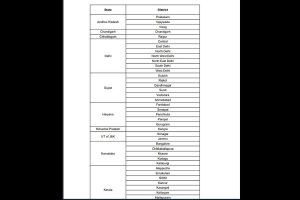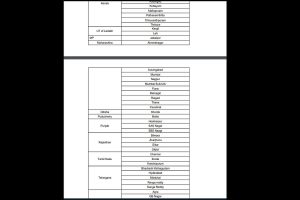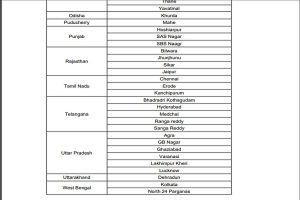Rahul slams Modi for criticizing Cong manifesto; calls it ‘revolutionary’
The MP further said, "No power can stop caste census from taking place."
Currently, India is not in a complete lockdown mode. Perhaps there are ample of restrictions being imposed by the government, either central of state, to make the people stay inside, and maintain as much ‘social distancing’ as they can.

A deserted Rajpath road is pictured during a one-day Janata curfew imposed as a preventive measure against the COVID-19 coronavirus. (Photo by Sajjad HUSSAIN / AFP)
With the cases of deadly coronavirus soaring rapidly in the country, the government has decided to impose lockdown in around 80 districts, an attempt to contain the spread of the virus.
After the lockdown was imposed, there has been a sense of panic, as well as confusion emerged among the people about what preciously lockdown means and how is it going to affect their day to day life.
Prime Minister Narendra Modi taking the onus to contain the spread of the deadly virus, has last week announced a one-day unofficial lockdown on Sunday naming it as ‘Janata Curfew’. Things went smooth as the day was Sunday – already a public holiday and people were enthusiastic towards the first time lockdown of the 21st century in India.
Advertisement
But the things are not going to be the same, as now it’s not a one-day event but a week-long lockdown in the almost entire nation.
Yesterday, amid the one-day ‘Janata Curfew’ was in effect, the Prime Minister Office advised the state governments to allow essential services in 13 states and 80 districts where the cases of deadly coronavirus were found positive.
These districts include major cities such as New Delhi, Mumbai, Bangalore, Hyderabad, Chennai and Kolkata among others where the positive cases of COVID-19 were found and come under the ambit of the advisory.
Apart from the government advisory, several states including Maharashtra – the state with a maximum number of cases, Kerala, Haryana, Uttar Pradesh, Uttarakhand and West Bengal imposed complete or partial lockdown in order to put the citizens indoor and make them less vulnerable to the virus.
Is India in a complete lockdown mode?
In a lockdown emergency protocol, people are not allowed to leave from a given area for a specific time period until the lockdown is imposed. But in a complete lockdown situation, you have to stay where you are, and you are not allowed to leave the premises or the building in which you are currently in.
Currently, India is not in a complete lockdown mode. Perhaps there are ample of restrictions being imposed by the government, either central of state, to make the people stay inside, and maintain as much ‘social distancing’ as they can.
In the current lockdown scenario, only essential services will be allowed.
“Essential services are clearly defined and include ration, groceries, milk, medical services, transport of essential needs among others,” Ministry of Health and Family Welfare said.
Here is the list of 75 districts which are under lockdown as announced by the government yesterday:



Are these districts legally bounded?
Definitely, the districts where the lockdown has been announced or in future where it will be announced, then they will be legally obliged to follow the rules. If they fail to do so, then they will be punished.
As per Section 2 of The Epidemic Diseases Act, 1987, the government has the powers to take special measures and prescribe regulations necessary to contain the spread of disease.
Section 3 of the Act allows the government to impose a penalty on those flouting any rule under the Act.
Violation of rules will invite a jail term which may extend up to one month or a fine of Rs 200 or both.
Who can go to work?
Almost every organization whether government or private has provided ‘work from home’ option to their employees in order to restrict their commutation to work.
But there are some who are fighting the battle against the deadly coronavirus.
According to a PTI report, Delhi is exempting these services:
However, the Supreme Court has said the lawyers’ chambers inside the court premises will remain shut from Tuesday 5 pm onward in view of the Coronavirus outbreak.
The apex court also said that there will be no more in-person hearings till further orders. For the first time, the Supreme Court will conduct video conferencing to hear urgent matters.
What will go off-service in this period?
The most important service that will be shut is Railways, as the Indian Railways has suspended all its passenger trains till March 31.
All international flights also stand cancelled, and the Delhi government has announced all domestic flights to and from the national capital to be cancelled in this period too.
Inter-state bus services are suspended; Delhi Metro and Kolkata Metro have announced the halt of its services.
Borders of almost every state are sealed in view of the coronavirus to restrict the movement of people.
All shops, malls, and other commercial establishments remain suspended.
However, people need not panic about the availability of daily household needs, as the government has assured proper arrangements.
What to do in this period?
It is advised to maintain hygiene while staying at home. Keep your house sanitized, avoid unnecessary visits, wash your hands with hand-wash or soap for at least 20 seconds.
Use disinfectant wipes on the appliances that you touch, in order to avoid germs to sustain there.
Don’t panic, just call the 24×7 toll free National Helpline number 1075 for support, guidance, and response to health-related queries on coronavirus.
The Ministry of Health has informed that N95 masks and personal protective equipment have been provided to states as and when they need.
The government has geared up to take the fight against the health emergency that has taken the planet in its grip.
Cabinet Secretary has written a letter to State Chief Secretaries highlighting
* States must monitor situation 24×7
* Additional restrictions if necessary may be imposed
* All current restrictions must be enforced strongly
* All violations should be met with legal action
Advertisement